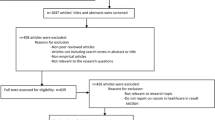Abstract
Resident physicians training in psychiatry in the U.S. are required to master a body of knowledge related to cultural psychiatry; are expected to adopt attitudes that endorse the principles of cultural competence; and finally are expected to acquire specific cultural competence skills that facilitate working effectively with diverse patients. This article first provides an overview of the Accreditation Council for Graduate Medical Education (ACGME) competencies related to cultural competence, as well as the American Academy of Child and Adolescent Psychiatry’s (AACAP) recommendations for the cultural competence training of child/adolescent fellows. Next, numerous print and electronic resources that can be used in cultural competence education in psychiatry are reviewed and discussed. Finally, we conclude by providing recommendations for psychiatry residency programs that we culled from model cultural competence curricula.
Similar content being viewed by others
References
Lewis-Fernández R, Aggarwal NK, Bäärnhielm S, et al. Culture and psychiatric evaluation: operationalizing cultural formulation for DSM-5. Psychiatry. 2014;77(2):130–154. doi:10.1521/psyc.2014.77.2.130.
Colby SL, Ortman JM. Projections of the size and composition of the US population: 2014 to 2060. Curr Popul Reports. 2014:P25-P1143
Aggarwal NK, Desilva R, Nicasio A V., Boiler M, Lewis-Fernández R. Does the cultural formulation interview for the fifth revision of the diagnostic and statistical manual of mental disorders (DSM-5) affect medical communication? A qualitative exploratory study from the New York site. Ethn Health. 2013;20(1):1–28. doi:10.1080/13557858.2013.857762.
APA. Diagnostic and Statistical Manual of Mental Disorders (4th Ed.).; 1994:69–81.
Aggarwal NK, Lam P, Castillo EG, et al. How do clinicians prefer cultural competence training? Findings from the DSM-5 cultural formulation interview field trial. Acad Psychiatry. 2015. doi:10.1007/s40596-015-0429-3.
Aggarwal NK, Nicasio AV, DeSilva R, Boiler M, Lewis-Fernández R. Barriers to implementing the DSM-5 cultural formulation interview: a qualitative study. Cult Med Psychiatry. 2013;37(3):505–533. doi:10.1007/s11013-013-9325-z.
American Psychiatric Association. Diagnostic and StatisticalManual of Mental Disorders, 5th Edition (DSM-5). Diagnostic Stat Man Ment Disord 5th Ed. 2013;749–759.
Rousseau C, Guzder J. Teaching cultural formulation. J Am Acad Child Adolesc Psychiatry. 2015;54(8):611–612. doi:10.1016/j.jaac.2015.03.022.
Qureshi A, Collazos F, Ramos M, Casas M. Cultural competency training in psychiatry. Eur Psychiatry. 2008;23(SUPPL. 1):49–58. doi:10.1016/j.eurpsy.2007.11.003.
Kirmayer LJ, Kirmayer L. Rethinking cultural competence. Transcult Psychiatry. 2012;49(2):149–164. doi:10.1177/1363461512444673.
Ambrose AJH, Lin SY, Chun MBJ. Cultural competency training requirements in graduate medical education. J Grad Med Educ. 2013;5(2):227–231. doi:10.4300/JGME-D-12-00085.1.
Accredititation Council for Graduate Medical Education, American Board of Psychiatry and Neurology. The Child & Adolescent Psychiatry Milestone Project.; 2015.
American Academy of Child and Adolecent Psychiatry. Practice Parameters. Practice Parameters. http://www.aacap.org/aacap/resources_for_primary_care/practice_parameters_and_resource_centers/practice_parameters.aspx. Accessed 15 July 2016.
Pumariega AJ, Rothe E, Mian A, et al. Practice parameter for cultural competence in child and adolescent psychiatric practice. J Am Acad Child Adolesc Psychiatry. 2013;52(10):1101–1115. doi:10.1016/j.jaac.2013.06.019.
Bhugra, D, Bhui K, ed. Textbook of cultural psychiatry. Cambridge, UK: Cambridge University Press; 2011.
Lim RF. Clinical manual of cultural psychiatry (2nd ed.). Clin Man Cult psychiatry (2nd ed ) Arlington, VA, US Am Psychiatr Publ Inc; US. 2015.
Tseng W-S. Clinician’s Guide to Cultural Psychiatry, 2003. doi:10.1016/B978-012701633-7/50006-7.
Kirmayer LJ, Lemelson R, Cummings CA. Re-Visioning Psychiatry: Cultural Phenomenology, Critical Neuroscience, and Global Mental Health.; 2015. doi:10.1017/CBO9781139424745.
Alarcon, R. D. and Wise TN, ed. Cultural Psychiatry (Advances in Psychosomatic Medicine, Vol. 33). Basel, Switzerland: S. Karger
Bhattacharya, R., Cross, S., and Bhugra D, ed. Clinical Topics in Cultural Psychiatry. London, UK: RCPsych Publications
American Academy of Child and Adolescent Psychiatry. Systems-Based Practice: Cultural Considerations in System’s-Based Practice.; 2016. https://www.aacap.org/App_Themes/AACAP/docs/resources_for_primary_care/training_toolkit_for_systems_based_practice/i - Systems Based Practice Module - Cultural Considerations For Web.pdf.
Lim, RF, Koike, AK, Gellerman, DM, Seritan, AL, Servis, ME, Lu F. A Four-Year Model Curriculum on Culture, Gender, LGBT, Religion, and Spirituality for General Psychiatry Residency Training Programs in the United States. http://www.ucdmc.ucdavis.edu/psychiatry/aboutus/dac/cultural_competence_curriculum.pdf. Published 2010.
LGBT Issues Committee, (GAP) Group for the Advancement of Psychiatry. LGBT mental Health Syllabus. http://www.aglp.org/gap/. Accessed 26 July 2016.
Author information
Authors and Affiliations
Corresponding author
Ethics declarations
Conflict of Interest
The authors declare that they have no conflict of interest.
Funding
There was no funding for this study.
Ethical Approval
This article does not contain any studies with human participants or animals performed by any of the authors.
Informed Consent
For this type of study, formal consent is not required.
Rights and permissions
About this article
Cite this article
Corral, I., Johnson, T.L., Shelton, P.G. et al. Psychiatry Resident Training in Cultural Competence: An Educator’s Toolkit. Psychiatr Q 88, 295–306 (2017). https://doi.org/10.1007/s11126-016-9472-9
Published:
Issue Date:
DOI: https://doi.org/10.1007/s11126-016-9472-9



